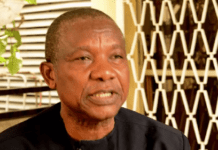Practitioners from the various fields of Medicine have highlighted the necessary strategies for attaining zero malaria burden in Nigeria, stating that both the government and the citizenry have crucial roles to play to achieve the goal.
The experts, who unanimously made the submission at the workshop organised by the Nigeria Institute of Medical Research (NIMR), in collaboration with the Society for Mosquito Control in Nigeria and the Malaria Society of Nigeria, emphasised effective environmental management as the best prevention strategy for the disease.
In his address at the gathering, the Lagos State Commissioner for Health, Dr Jide Idris, listed environmental management practices to be adopted by Nigerians to include: Effective refuse management, dredging of canals and channels; integrated vector control; as well as operational research for evidence-based programming and decision making.

Idris further explained that recent studies had shown that malaria-causing mosquitoes, which hitherto used to breed only in dirty and polluted water, now breed in clean stagnant water, adding that the studies equally found the parasites to be highly endophilic (residing indoors) and thus requiring Indoor Residual Spraying for effective control.
The health commissioner, citing additional researches, noted that mosquitoes have been found to be resistant to the conventional insecticides, pyrethroids – which, according to him, is an indication for the development of new strategies to combat the parasite.
Idris, who was represented by Dr Abimbola Osinowo, director, Lagos State Malaria Elimination Control Programme, at the workshop, also mentioned over-diagnosis of malaria, as one of the challenges besetting efforts to eradicate the disease.

According to her, “Diagnosis, prior to treatment of malaria, improves the overall management of patients with fever and helps to reduce the emergence and spread of drug resistance by reserving antimalarials for those who have the disease. It is equally important that all malaria cases diagnosed are recorded in the appropriate data tool to ensure that all malaria cases in the State are duly reported.”
The President, Malaria Society of Nigeria (MSN), Dr John Puddicombe, stressed the need to take malaria campaign to the nooks and crannies of the rural areas, noting that the theme of this year’s World Malaria Day, “Zero Malaria Starts with Me”, cannot be said to be true in Nigeria, if the rural dwellers are still ignorant of the prevention strategies for the disease.
“We need to take our awareness campaign to the grassroots because it is until we take this theme of ‘zero malaria starts with me’ round the rural communities that we can reduce the burden of malaria to a great extent”, he said.
Puddicombe also faulted the materials currently being used for the production of insecticide-treated nets, saying they are often not usable without electricity, as it has been observed that they generate heat beyond bearable limits for users in the absence of power supply.
Dr Bamgboye Afolabi, chief medical research Fellow, NIMR, was particularly concerned about the quality of antimalarial products in the country, saying many of them are fake and substandard.
While highlighting the economic burden of malaria for individuals and government, Afolabi stressed that the quality of pharmaceutical commodities in the management of malaria is a key factor that must be considered.
He further tasked pharmaceutical companies on the production of high quality antimalarials for effective treatment of the disease, noting that this will accelerate the eradication target.
Speaking earlier, the Director General, NIMR, Prof. Babatunde Salako, identified gaps in access to and uptake of lifesaving antimalarial commodities and interventions, saying these gaps must be filled, if malaria is to be defeated for good.
The NIMR DG, represented by Dr Sola Smith, a research fellow of the Molecular Biology & Biotechnology Department of the institute, also mentioned that Nigeria, Madagascar and the Democratic Republic of Congo are leading in malaria burden, according to the 2018 World Malaria Report. This, he said, is an indication that more concerted steps must be taken to eliminate the disease in the country.













